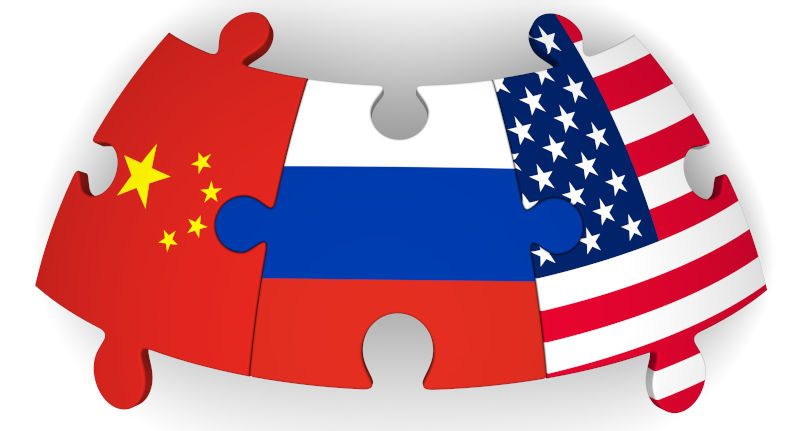Australia is on a collision course with the major source of our prosperity. The collision is not yet a fait accompli. To avoid the collision will require breaking the shackles of the Rules-Based Order. Australia faces a geopolitical conundrum of major, if not epic, proportions.
With the recent release of the National Defence Strategy (NDS), the Albanese Government has confirmed that it is ‘all in’ with the rules-based order (RBO). The NDS claims that Australia’s future depends in large part upon upholding the RBO. To that end the fifth task of the Australian Defence Force is to ‘Contribute with our partners to the maintenance of the global rules-based order.’
In a momentous, if not epochal defining announcement, the People’s Republic of China and the Russian Foundation, released on 16 May 2024 a Joint Statement on the ‘Deepening the Comprehensive Strategic Partnership of Coordination for a New Era.’
This Joint Statement, building on a previous Joint Statement released immediately before Russia commenced its Special Military Operation in Ukraine, is a clear, direct and explicit repudiation of the RBO. The Chinese and Russian position is that the RBO is an attempt to subvert the recognised international order based upon international law by countries that adhere to ‘hegemonism and power politics.’
In the Joint Statement, Russia and China declare their opposition to the United States’ hegemonic behaviour including the assembling of military blocs. A clear reference to agreements such as AUKUS.
Australia finds itself in a situation where we have committed to maintaining the RBO (which Patrick Porter describes as being a ‘theology of restoration that frames foreign policy as a morality play’) whilst China has committed to opposing that order. Australia has thus put itself on a collision course with China, the major source of our prosperity. An irreconcilable position which is a direct consequence of ideology trumping strategy.
As the last phrase of the Joint Statement’s title indicates, the world has entered a ‘New Era.’ That new era sees the rise of the global ‘south’ or the global ‘majority’, and the decline of the West. This transition has been decades in the making, facilitated via a series of strategic blunders by the United States, supported by sub-imperial powers (such as Australia), and its vassal states. A tipping point was the proxy war in Ukraine which has greatly accelerated the transfer of the balance of power from west to east. We are now at the point where the United States’ imperial system is in free fall.
A symptomatic indicator of this decline is the regular, at this point almost routine, back firing of Western actions. Examples include the European Union’s 13 rounds of sanctions packages against Russia that have significantly weakened European economies whilst having limited impact on Russia, or the weaponisation of the US dollar which is rapidly contributing to the rise of alternate trading systems and de-dollarisation. These are examples, as described by Adjunct Professor Warwick Powell, of ‘autoimmune’ responses. Responses that weaken the West with limited impact on their target. AUKUS itself can be viewed as an autoimmune response to the unfolding collapse of Western hegemony.
How far will Australia go to ‘maintain’ the RBO? With the imperial system that underpins the RBO collapsing, irrevocably if the history of empires is any guide, then ‘maintain’ is an inappropriate verb. If as the NDS states Australia’s future depends upon upholding the RBO (which in itself is a dubious proposition) then the correct verb would be to ‘restore.’ Given the position elucidated in the Joint Statement, a restoration of the RBO would most likely lead to conflict between the United States and its coterie on one side and China and Russia on the other.
The existential question for Australia thus becomes, are we willing to risk war with our largest trading partner, or worse – World War Three, for the sake of restoring the RBO? A position that may be considered an auto-immune response on steroids!
What is striking about Australia’s position, as defined by the NDS, is how utterly unprepared we are for a major conflict. Just as the proxy war being fought in Ukraine against Russia has highlighted significant deficiencies in much of NATOs weaponry, doctrine, combat capability and industrial capacity, a conflict with China would very rapidly highlight how woefully underprepared Australia is from both the perspective of our combat capabilities and the Australian economy.
This highlights the sheer folly of the NDS. Not only has the NDS confirmed Australia is on a collision course with China (and Russia), but we are in no position to meaningfully fight, let alone win that conflict.
It is quite incredible that the leadership of any country could willingly place itself in such a position. We are not alone however in this folly. With the exception of outliers like Hungary, the majority of European governments have also adopted similar untenable strategies. The common denominator is the stranglehold with which the United States’ imperial infrastructure holds, like a cancerous growth, over Western institutions. Infecting not only the geopolitical culture but the key organs of state such as politics, defence, intelligence, and the media.
At this critical juncture, could Australia’s future be secured by an alternative to the increasingly problematic RBO?
Could Australia’s future be secured by an international order underpinned by international law, the United Nations and the United Nations Charter?
Could Australia’s future be secured by an international system where nations have the right to independently choose their economic and social systems based on their national circumstances?
Could Australia’s future be secured by an international system where foreign interference in our internal affairs and unilateral sanctions with no basis in international law is opposed?
Could Australia’s future be secured by an international system where disputes are resolved through negotiation and consultation by the countries directly concerned, without interference from external forces?
The answer to all these questions, and many similar questions, is a definitive yes.
These are some of the positions laid out in the Joint Statement. Read in its entirety the Joint Statement is a manifesto for a world that is more democratic, more equal and more secure. Not just for China and Russia, but for all nations. As such it offers a much more attractive proposition to the global majority than anything on offer from the collective West. It is also backed up by actions, not just rhetoric, as China’s Belt and Road Initiative demonstrates.
Australia has little to gain from upholding the RBO as the basis of our future security but much to lose. These losses may well result from ever increasing tensions with China, if not outright conflict. But these losses will almost certainly be realised through the many lost opportunities for Australia in the rapidly evolving multipolar world, in addition to the reputational losses accruing through our anachronistic clinging to the RBO.
Australia’s collision course with China is not yet a fait accompli. We can change course and be much the better for it.
It is time for Australia to break free from the shackles of the Rules Based Order.
Cameron Leckie served as an officer in the Australian Army for 24 years. An agricultural engineer, he is currently a PhD candidate.

